Creating a culture of excellence has always been a challenge, especially since both internal and external factors often keep changing. There is a need to redefine the way employees and individuals can contribute towards the excellence drive. We hear from organisations and experts who have created such thriving systems to walk on the path of manufacturing excellence. In this context, CII Western Region recently organised a session at Westin, Pune where industry leaders shared their experiences of manufacturing excellence. Panellists for the session were Alakesh Roy (session moderator), Convenor, CII Forum of Operational Excellence and Managing Director, Zamil Steel Buildings India; Govind Gadgil, Zilla Prabhagi, Patanjali Ayurved; Medha Tadpatrikar, Director, Rudra Environmental Solution India and Pulin Shah CMD, Reactive Polymers. Corporate Citizen brings to you the excerpts from the riveting session
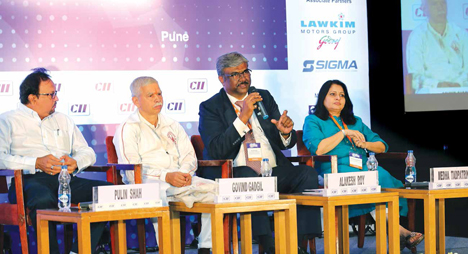
Alakesh Roy: If you want to innovate, stop training employees and if you keep on training people, they will be only doing the same job over and over again. There will be nothing new in this scenario. You need to educate people; until and unless you will educate people they will not think and if they will not think, they will not innovate. You might be facing situations which would never have come into your life, so the only way to survive is to innovate. Be it a product or be it a technology, you will have to adapt it to grow and survive.
There are millions of examples of technology, which are the best but that technology is simply died—typewriter being one and another technology being the age-old is wristwatch. It has survived every technological onslaught but we all love to wear it. Because that has now become a fashion accessory and status symbol. You need to create value in your product and value in your thought process to innovate and to stay in business. This is the need of the hour.
In future, there will be only two qualifications, whether you are relevant or you are irrelevant. There cannot be any other qualification. You might have a degree, you might have fancy rankings in your colleges but if you are not relevant, then you are out of your business.
Govind Gadgil: I am going to share with you Patanjali’s success story. Patanjali Ayurved had to innovate in every domain in order to be in the market, survive and gain market share. Twenty years ago, Swami Ramdev founded Patanjali Ayurved and since then, he started working in the medicine field, i.e. Ayurveda. Earlier in the evenings, many people used to watch different kinds of programmes on TV, he used that opportunity to reach thousands of people and tell them the benefits of yoga. Swamiji also made sure that everyone knows the benefits of Ayurved. In order to manufacture and conduct sciencebased research on Ayurvedic medicines, Swamiji has established a scientific research institute at Haridwar, Uttarakhand. The cost of this institute is Rs.200 crore.
Mahatma Gandhi insisted on using swadeshi goods but nobody took that initiative seriously in our country. Nobody was manufacturing swadeshi goods in India. Swamiji has decided to change that market situation and has been working to promote swadeshi goods and products in India.
Whatever the syllabus Indian schools and colleges have is not originated in India but in foreign countries. When one gets his/her degree, they opt for post-graduation, but at times, they are not able to earn enough money. Considering that scenario, he started Patanjali’s first school, Acharyakulam in Haridwar. The students are taught yoga and latest technologies in science.
In India, we don’t get any products which are good for our health. Foreign companies, which conduct business here, are not beneficial for our health. ‘Dant Kanti’ was the Patanjali’s first product, which became very popular and as a result, Patanjali became well-known among people. The toothpastes, which are made by foreign companies, damage the teeth due to harmful chemicals; ‘Dant Kanti’ is a chemical-free toothpaste. After using it, you will not have any teeth-related problems.
We are manufacturing 15,000-crore-worth products every year. Also, we have set up a plant in Assam, recently whose annual turnover will be Rs.25,000 crore. Around 1,000 products of Patanjali’s are being used across India.
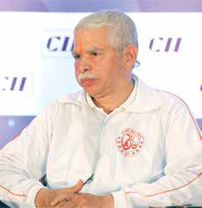
It was all possible due to Acharya Balkrishna, he and Swamiji joined forces and started Patanjali Yogpeeth in Haridwar. Production of amla and aloe vera juice started there. The daily output of the juices is 500 tonnes. The production had started but how to sell such huge quantities of juices? So Swamiji called all the employees at Haridwar, some of them were chosen to market the products from villages to rural areas at Haridwar. But, if the daily production is 500 tonnes, imagine how much waste is generated. So to tackle it Acharya Balkrishna thought of an idea, to burn all the waste that is left after the juice is extracted. The ash that remains is used to make dishwashing soap. As a result, no resource is wasted; every bit of the resource is used to make products.
Patanjali outlets are in all the villages as well as urban areas where people can get ayurvedic medicines at minimal cost.
The money earned by Patanjali Ayurved is not for its employees, it is for the society. At Haridwar a few years ago, an unfortunate natural calamity had occurred, where 150 children had lost their families in that disaster. So Swamiji adopted these children and started an educational institute worth Rs.25 crore. Since the school is 20 km away, he has arranged daily buses for the students. Philosophy of Patanjali is decentralised, sustainable, inclusive and justified growth. Patanjali Ayurved is based on three pillars—big goal, hard work and determination.
“Mahatma Gandhi insisted on using swadeshi goods but nobody took that initiative seriously in our country. Swamiji has decided to change that market situation and has been working to promote swadeshi goods and products in India”
—Govind Gadgil
Medha Tadpatrikar: I represent Rudra Environmental Solutions. Everybody uses plastic everyday and it is a part of our life. It is a brilliant product, which was discovered only a century ago.
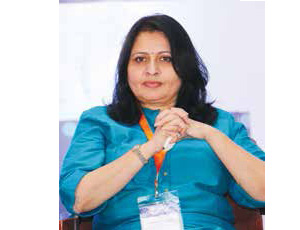
For the first three months, we were trying to understand what is plastic. One thought came to my mind, since water turns into ice and ice turns to water, can we do the same thing with plastic? Since plastic is made from petrochemicals and it is volumetric, that means 1 litre of plastic water bottle is hardly about 20 grams. We did a few experiments and later we started to notice that something was happening. After testing it, we realised that it is hydrocarbon fuel and we started working on it. We are pioneers in India to develop waste-to-fuel technology.
We recycle most of the plastic. How long does it take for plastic to disintegrate? Thousands of years and that too is a guess, because we haven’t seen any plastic disintegrate or degrade. This is because it was discovered just a century ago and none of us will be able to witness a chocolate wrapper disintegrate. According to statistics, 80 thousand billion metric ton of plastic is lying in oceans, either in landfill or in rivers. Every plastic product that has been manufactured since its discovery is still on this planet. Considering its time required to disintegrate, if you are able to make something out of it, it is brilliant.
Rudra Environmental Solution was established in 2009; we are an ISO-certified company. We are contributing under Swachh Bharat and Make in India initiative. We are a financially viable, any technology has to be financially-viable, otherwise it's just a hobby.
First, we shred the thinner type of plastic, which cannot be recycled, like multilayer packaging, and that type of plastic has no monetary value. We don’t segregate the plastic, because the cost to segregate is very high. We get more than 100 different types of plastic, so you cannot separate the unwanted ones. After shredding the plastic, it is fed to the reactor, we add a catalyst and we heat the reactor, the heating happens through our own fuel and then the gas is generated. This is very energy-efficient system and around at 180° Celsius, the gas is formed, this gas is a mixture of propane, methane and butane, which is similar to LPG. That gas is collected and compressed and we use that gas for our processes of heating the reactor. At around 330° Celsius, the oil/fuel starts to form; once the fuel starts forming, it starts to come out very fast. For 100 kg of plastic, we can get around 50-80 litres of fuel. The entire process from starting the reaction to getting the fuel takes about 5-6 hours. The fuel can be used directly in furnaces, generators, incinerators, etc. After the process, there remains a residue (char), which can be used in tar roads. Recently, we donated 50 metric tonne of waste plastic to PMC. (Pune Municipal Corporation). By using our waste plastic, they are making a 25-km-long road; the saving is Rs.30,000 per square kilometre. These roads are strong as well. We have a plant in Hyderabad, which is a three-tonne plant. The fuel that is generated is much more cleaner and has less emission as compared to petrol and diesel. There is a company, which is using our fuel for burners for past six months, and it has given good results.
We have now been working for past 8-9 years on plastic; we see a lot of different kinds of plastic every day.
”We recycle most of the plastic. How long does it take for plastic to disintegrate? Thousands of years and that too is a guess, because we haven’t seen any plastic disintegrate or degrade”
—Medha Tadpatrikar
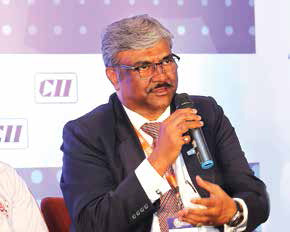
Because of our work, we are working with villages. We realised that they do have cooking gas but in the morning, when they are heating the water for bath, they burn wood or plastic bottles. Keeping that in mind, we are giving them fuel at a cheaper rate. Women there, don’t have much of work to do, so we thought could we do something about the plastic? We have been working with them and we came across a new development wherein we have developed a machine, which will develop plastic sheets of waste plastic, and these stitch it into files and folders and they are sold to various colleges, schools and even corporates. This development started about 6-8 months ago.
We hear so much of waste plastic in oceans. Today if you look at the amount of plastic in the ocean, for three kilos of fish weight, there is 1 kg of plastic; by 2030, it is going to be almost the same.
Somebody came to us, and said, ‘There is lot of plastic, which is mixed in beach soil, and can we use this into machine and turn to fuel?’.However, because of the sand, the machine can be damaged. So what if we decided to wash it, water will take away the sand, we will have clean plastic but then what you do of that water? So what we thought, can beach waste be turned into roof tiles as well as paving blocks? There is no need to separate sand from the plastic; it goes directly into the machine, and few chemicals are added into the reactor. Roof tiles are sturdy and lightweight. This machine is at the developing stage and it will be ready in a month or two.
“In future, there will be only two qualifications, whether you are relevant or you are irrelevant. If you are not relevant then you are out of your business”
—Alakesh Roy
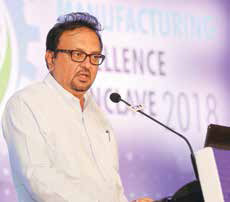
Pulin Shah: I am an engineer in plastics. I have more than 35 years of experience with business management and polymer. I am the president of the association of plastic manufactures and traders and a patent holder for release-free mouldings of cold cure foams. We are manufacturing sofas and we have supplied more than half a million of sofas till date. We produce a sofa every six minutes. We are an ISO 9001:14001 company.
Why we are in business? Answer is pretty simple—profit, growth, turnover, development and diversification. After being able to achieve these factors, we are looking for sustainence. How do you sustain and grow? By being attuned to the change. Change is the only permanent thing. Companies who are willing to accept the change will survive and flourish. We have plenty of examples where the businesses have failed to recognize the upcoming change. They have closed down. Nokia didn’t recognise that android is a better platform for mobile devices and it will be the future. They didn’t adapt and they failed.
We, at Reactive Polymers, have tried to adapt with the change, tried to productionise our activities. We started manufacturing polyethene foam, which is just an intermittent product for any kind of seating systems. We saw that the challenges we faced—low margins, very-easy-tomake, very low-entry barrier and lot of things like that and other factors. We adapted and decided that this is not the way we would want to continue and therefore we entered into manufacturing of finished products like cinema hall seats, bus seats and sofas.
“How do you sustain and grow? By being attuned to the change. Change is the only permanent thing. Companies who are willing to accept the change will survive and flourish. We have plenty of examples where the businesses have failed to recognize”
—Pulin Shah
There are 2 lakh people manufacturing sofas in India, but we wanted to productionize the activity, which we did by using a conveyer system. The finished sofa is also packed on the conveyer itself. The sofas are then dispatched using an overhead conveyer, which moves in the entire factory; there are about 100 sofa boxes on the overhead conveyer and then it goes directly into the container. There are other small ideas in terms of big innovation—a chute drops the stitching material on the conveyer and the sofa, which is ready, has to be stitched and made ready in six minutes. Another improvisation, which we did in terms of transporting the sofas to the transport vehicle. Earlier, it took four people to manually pick up the sofa, keep in the vehicle but after using a trolley to transport the sofa, this has reduced my loading time into the transport vehicle by 35 minutes, and earlier it used to take 62 minutes to load into the vehicle.
We have introduced a 10-metre panel called ‘War on Defect’. Whenever there are defects/ problems noted on the wall, we solve the problems by identification, team creation, analysis and solving those defects. Principle of do it right, first time has been engrained in the people. There are no customer returns or complaints in the FY 2017-2018 as a result, customer satisfaction has been the highest.
By Vineet Kapshikar